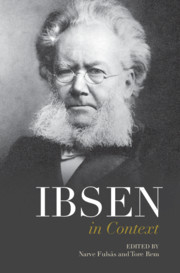Book contents
- Ibsen in Context
- Ibsen in Context
- Copyright page
- Contents
- Figures
- Contributors
- Preface
- Notes on the text
- Chronology
- Part I Life and Career
- Part II Culture and Society
- Part III Scandinavian Reception
- Part IV Internationalization
- Chapter 17 Copyright
- Chapter 18 Censorship
- Chapter 19 German Reception
- Chapter 20 British Reception
- Chapter 21 French Reception
- Chapter 22 Parodies
- Chapter 23 Early Globalization
- Part V Afterlives
- Further Reading
- Index
Chapter 20 - British Reception
from Part IV - Internationalization
Published online by Cambridge University Press: 23 April 2021
- Ibsen in Context
- Ibsen in Context
- Copyright page
- Contents
- Figures
- Contributors
- Preface
- Notes on the text
- Chronology
- Part I Life and Career
- Part II Culture and Society
- Part III Scandinavian Reception
- Part IV Internationalization
- Chapter 17 Copyright
- Chapter 18 Censorship
- Chapter 19 German Reception
- Chapter 20 British Reception
- Chapter 21 French Reception
- Chapter 22 Parodies
- Chapter 23 Early Globalization
- Part V Afterlives
- Further Reading
- Index
Summary
This chapter focuses on the early British reception of Ibsen. It begins with Edmund Gosse’s early initiatives and Ibsen’s introduction to the English-speaking world. The next phase involves a group of socialists and feminists who in the 1880s made Ibsen their own, including Eleanor Marx, Olive Schreiner and George Bernard Shaw. Towards the end of that decade Ibsen experienced surprising success in book form, not least through William Archer’s translations. His breakthrough on the British stage came in 1889 and was followed by a number of intense years with many productions and publications. One notable feature of Ibsen’s stage success was the strong involvement of a number of actresses, who even took on the stage-management of his plays, not least Janet Achurch, Elizabeth Robins and Marion Lea. The most notorious event involved the 1891 performance of Ghosts at the Independent Theatre and involved brushes with the censor, while the production of Hedda Gabler was celebrated as a critical success. After the fierce cultural battles over Ibsen in the early 1890s, a swift canonization followed. The last part of the chapter briefly charts Ibsen’s association with the independent theatre sector, his place within the commercial London theatre and key publishing ventures.
Information
- Type
- Chapter
- Information
- Ibsen in Context , pp. 175 - 183Publisher: Cambridge University PressPrint publication year: 2021
